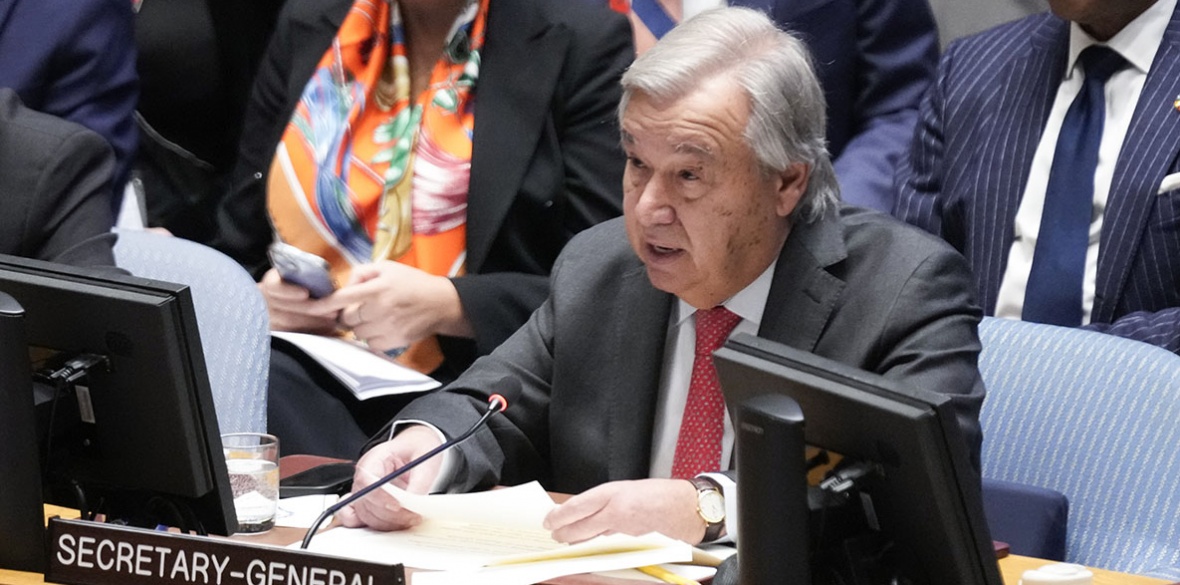ISRAEL’S announcement that it will “teach a lesson” to the United Nations by denying visas to its representatives only highlights its growing isolation — and that of its Nato allies.
Its brutal bombardment of Gaza has already killed at least 29 employees of the UN Relief and Works Agency for Palestine Refugees in the besieged strip, a tiny proportion of the civilian casualties but a telling sign of Tel Aviv’s contempt for international law.
The UN’s structure has prevented it from giving a clear moral lead with the United States vetoing calls for a ceasefire. But the remarks by secretary-general Antonio Guterres that have so riled Israeli leaders — that Hamas’s attacks on October 7 did not happen “in a vacuum” and must be linked to “56 years of suffocating oppression” of Palestine by Israel — were a statement of fact.
More could have been said. It is not just the decades-long denial of Palestinian statehood, the ongoing routine violence of the occupation or the siege of Gaza that set the scene for those terrifying events.
It is that the oppression of Palestinians has become rapidly more extreme in recent years, from Israel’s adoption of the racist Nation-State Law, through the massacre of unarmed demonstrators on the Gaza border during the March of Return protests, to the appointment of self-described fascist ministers who would have been beyond the political pale even five years ago.
In the days and weeks running up to October 7 we also saw repeated incursions and attacks on Palestinians at the al-Aqsa mosque in Jerusalem.
The outrages of that terrible weekend were a direct consequence of the collective punishment of the Palestinians, but are being used to justify a savage intensification of that collective punishment with no end in sight.
US officials reportedly express concern that Israel has no agreed outcome from any ground invasion of Gaza in mind. But influential Israeli figures do: former national security adviser (2017-21) Meir Ben Shabbat’s think tank the Misgav Institute for National Security and Zionist Strategy welcomes “a unique and rare opportunity to evacuate [sic] the whole Gaza strip,” that is, to exploit Western horror at the Hamas attacks to ethnically cleanse the area and expel all Palestinians there to Egypt.
In May, EU officials cancelled a “Europe Day” reception in Jerusalem because Israel’s racist National Security Minister Itamar Ben-Gvir planned to attend. In July, the US embassy in Israel declined to invite Ben-Gvir or Finance Minister Bezalel Smotrich to an independence day event because of their extreme racist politics.
Hamas’s attack on Israel cannot be used to sanitise politicians like this or normalise the ethnic cleansing ambitions neither troubles to hide. And the US has to veto ceasefire calls at the UN precisely because most countries have no intention of doing so.
This crisis further exposes the “West against the rest” divide increasingly visible in world politics.
European diplomats admit that efforts to convince developing countries to back Nato over the Ukraine war, already notably unsuccessful, have collapsed entirely because of hypocrisy over Israel’s occupation of Palestine.
And China, which hit back yesterday at the equally hypocritical US claims it is enlarging its military — the US continues to spend more on its armed forces than the next 10 countries combined, and has more than 20 times as many nuclear warheads as China — strikes a chord when it notes Washington is the “biggest disruptor of peace and stability” on Earth, and is actively escalating the violence in both Palestine and Ukraine.
It is not Western peoples who are isolated, but our politicians, as the huge Palestine demonstrations and the growing backlash against Keir Starmer for endorsing war crimes show.
If world opinion is for a ceasefire, British public opinion is too. The gulf between people and politicians should be used to build an anti-imperialist movement strong enough to stop the war.












